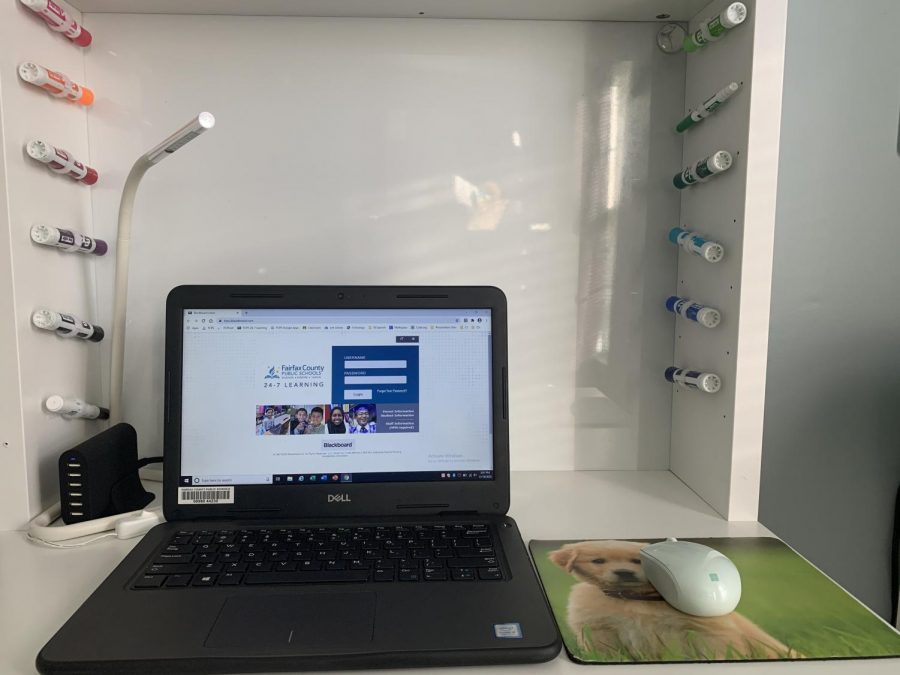After a distance learning fall, students prepare for hybrid learning
Lewis students share the frustrations and physical stress of distance learning
School for this article’s writer, junior Naomie Joseph has moved from Lewis’ classrooms to this at-home work station.
November 11, 2020
As FCPS students and teachers prepare to return to school for hybrid education this winter, Lewis High School students just finished their first quarter of graded distance learning.
FCPS has already returned students to the physical building in the order of students with disabilities, some English Language Learners, and early elementary school students. These students will be followed by primary grade students and specialized hands-on courses (such as academy classes). Most high school students will not return for in-person instruction until January 26.
Since quarantine began in March 2020, FCPS students have had to adapt to virtual school, and all in-person events pertaining to sports and clubs were immediately cancelled.
Many Lewis students missed the help of having a teacher nearby to assist. Other students just missed the interactions with their classmates.
For many, including senior Emanuel Pitt, online learning is inferior to in-person learning. “For me, I don’t like virtual school because I’m more of an in person type learner,” Pitt said.
Distance learning meant that students had to spend long hours each day learning and working from a computer screen at home, which resulted in side effects like eye strain, physical inactivity, distractions, and a lack of social interaction. In addition to class time, most students spent additional time after school finishing homework, projects, or studying.
Senior Aqmal Adrian gave suggestions for dealing with the fatigue of sedentary computer work. “Some of my teachers, at least, give me a break. So I [use that time to] just walk around and don’t look at the screen because it can get really straining to the eyes. I could take a five minute walk around my room and that’s it,” Adrian said.
Another disadvantage with virtual school, is the ability to get easily distracted. Since students now work from home, there are many background distractions and temptations to not pay attention or lose focus in class.
Pitt struggles with distractions at home without the guidance of a teacher. “At home, you can’t get the teachers to check on you. But at school you have to stay and sit in the classroom, and the teachers will check on you to make sure you are doing your work,” Pitt said.
Additionally, Adrian confirmed the problems with distractions at home but also mentioned another problem for both students and teachers. “I think it’s harder for kids to ask questions and just learn. It’s really easy to get distracted and it’s really easy to cheat. Cheating takes no effort now,” Adrian said.
The shift to distance learning means that Lewis students use Blackboard Collaborate and Google Meet to attend school. Both are similar with the camera, mic, chat, and break out room features. However, Blackboard Collaborate gives students the option to raise their hand, agree and disagree throughout the lesson.
When it was first implemented, last April, Blackboard Collaborate gave many connectivity issues to students, but this was fixed when the county upgraded to Blackboard Collaborate Ultra.
While FCPS teachers now have the technology to smoothly run online instruction, students are still having a hard time connecting with others. Without physical interaction, students are unable to build meaningful relationships with teachers and other classmates.
For this reason, Lewis’ Student Services team has continuously worked to help students learn how to care for their social and emotional health through advisory lessons.
Among those in Lewis’ Student Services is Counselor Jennifer Rogin-Marks, who stresses the importance of taking care of our emotional needs during difficult times.
“Our socioemotional health is so important because it will affect our daily lives in a positive and negative way depending on how proactive we are about taking good care of ourselves and the people around us. We can’t pour from an empty cup, so it is important to remain vigilant about taking care of ourselves,” Rogin-Marks said.
The advisory lessons include activities such as yoga/exercising, reading, listening to a podcast, meditating, practicing gratitude, getting fresh air, organizing work, and listening to music.
Rogin-Marks speaks about the purpose of these lessons and activities. “[Lewis students are taught] to recognize that whatever someone may be feeling through the pandemic is understandable, common and hopefully will help students feel encouraged to reach out for help and to do things for themselves that make them feel better,” Rogin-Marks said.
Although some students found advantages to distance learning, to most students and staff, distance learning has been a stressful experience and the prospect of returning to the building may seem complex.
Due to his work obligations and his learning style, Adrian believes that in-person instruction is superior.
“I think in-person is better overall. It’s very easy to just get around on here, but I definitely think learning is more personal. And it’s definitely easier for the teacher and the student to learn in-person. I can’t stay [after school for office hours] every single day. I’ve found that a really big inconvenience since I work a part time job,” he finishes.
Life has become stressful with so many changes in a short amount of time. However, we have managed to get through these hard times together. Although Lewis students and staff have had to drastically change our lives because of coronavirus, we have also managed to overcome and work through many obstacles in the virtual school environment.

